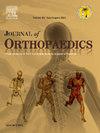Outcomes of total knee arthroplasty in people with diabetes: An overview of systematic reviews and meta-analysis
IF 1.5
Q3 ORTHOPEDICS
引用次数: 0
Abstract
Background and aims
Total knee arthroplasty (TKA) in people with diabetes is associated with increased risks of postoperative complications. This review evaluates how diabetes influences complication rates and overall outcomes following TKA.
Methods
An overview of systematic reviews and meta-analyses was conducted, with a comprehensive search performed across databases including PubMed, Scopus, Web of Science, and the Cochrane Library. The protocol was registered on PROSPERO on December 12, 2024.
Results
People with diabetes undergoing TKA face a 43 % higher risk of periprosthetic joint infection (PJI) and are 45 % more likely to experience deep vein thrombosis (DVT). The rates of hospital readmissions were significantly higher, showing a 28 % increased likelihood. Subpopulations with insulin-treated diabetes exhibited a 60 % greater incidence of perioperative adverse events. Notably, people with diabetes undergoing TKA had significantly higher odds of developing infection (OR 1.97, 95 % CI 1.48–2.61, p = 0.004) and deep PJI (OR 2.10, 95 % CI 1.49–2.95, p < 0.001). Significantly higher odds of DVT were observed in people with diabetes (OR 1.43, 95 % CI 1.23–1.66, p < 0.0000). Inadequate perioperative glycemic control was identified as a modifiable risk factor, although definitions varied widely across studies.
Conclusions
The presence of diabetes significantly impacts post-TKA outcomes, leading to higher complication rates and negatively affecting physical function and quality of life. Further rigorous studies are needed to establish standardized definitions for glycemic control and to investigate mechanisms contributing to increased risks, facilitating improved preoperative risk stratification and management strategies for diabetic patients undergoing TKA.

糖尿病患者全膝关节置换术的结果:系统综述和荟萃分析
背景和目的糖尿病患者全膝关节置换术(TKA)与术后并发症风险增加相关。本综述评估糖尿病对TKA术后并发症发生率和总体结果的影响。方法对系统评价和荟萃分析进行概述,并在PubMed、Scopus、Web of Science和Cochrane Library等数据库中进行全面搜索。该协议于2024年12月12日在PROSPERO上注册。结果糖尿病患者接受TKA后,假体周围关节感染(PJI)的风险增加43%,深静脉血栓形成(DVT)的风险增加45%。再入院率明显更高,表明可能性增加了28%。胰岛素治疗的糖尿病亚群围手术期不良事件发生率高出60%。值得注意的是,接受TKA的糖尿病患者发生感染的几率(OR 1.97, 95% CI 1.48-2.61, p = 0.004)和深度PJI (OR 2.10, 95% CI 1.49-2.95, p <;0.001)。糖尿病患者发生深静脉血栓的几率明显更高(OR 1.43, 95% CI 1.23-1.66, p <;0.0000)。围手术期血糖控制不足被认为是一个可改变的危险因素,尽管不同研究的定义差异很大。结论糖尿病的存在显著影响tka后的预后,导致更高的并发症发生率,并对身体功能和生活质量产生负面影响。需要进一步严格的研究来建立标准化的血糖控制定义,并调查导致风险增加的机制,促进糖尿病患者术前风险分层和TKA管理策略的改进。
本文章由计算机程序翻译,如有差异,请以英文原文为准。
求助全文
约1分钟内获得全文
求助全文
来源期刊

Journal of orthopaedics
ORTHOPEDICS-
CiteScore
3.50
自引率
6.70%
发文量
202
审稿时长
56 days
期刊介绍:
Journal of Orthopaedics aims to be a leading journal in orthopaedics and contribute towards the improvement of quality of orthopedic health care. The journal publishes original research work and review articles related to different aspects of orthopaedics including Arthroplasty, Arthroscopy, Sports Medicine, Trauma, Spine and Spinal deformities, Pediatric orthopaedics, limb reconstruction procedures, hand surgery, and orthopaedic oncology. It also publishes articles on continuing education, health-related information, case reports and letters to the editor. It is requested to note that the journal has an international readership and all submissions should be aimed at specifying something about the setting in which the work was conducted. Authors must also provide any specific reasons for the research and also provide an elaborate description of the results.
 求助内容:
求助内容: 应助结果提醒方式:
应助结果提醒方式:


